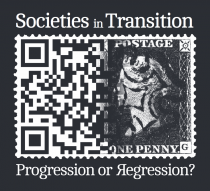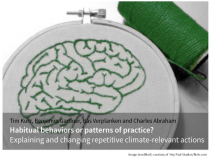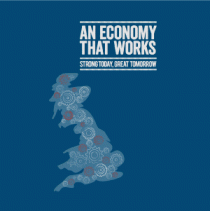- About
- Team
- Projects
- Children and the Environment
- ELiCiT (Exploring lifestyle changes in transition)
- Foundations for Sustainable Living
- HABITs
- Mapping Rebound Effects
- PASSAGE (Prosperity and Sustainability in the Green Economy)
- Policy Dialogue
- Price Responsiveness of Demand in Energy
- Resilience and Sustainable Lifestyles
- Sustainability Transitions in Food Systems
- Sustainable Living in Remote Rural Scotland
- Publications
- News
- Events
Publications
. Habitual behaviors or patterns of practice? Explaining and changing repetitive climate-relevant actions. WIREs Climate Change. 2015;6:113–128. Available at: http://onlinelibrary.wiley.com/doi/10.1002/wcc.327/pdf. habits_or_social_practice.pdf (192.57 KB)
habits_or_social_practice.pdf (192.57 KB)
. Civil society roles in transition: towards sustainable food?. 2014;02 - 14. wp_02_-_14_-_rachael_durrant.pdf (18.34 MB)
wp_02_-_14_-_rachael_durrant.pdf (18.34 MB)
. New Motherhood: A moment of change in everyday shopping practices?. Young Consumers. 2014;15(3):211 - 226. Available at: http://www.emeraldinsight.com/doi/abs/10.1108/YC-11-2013-00411.
. Who rebounds most? Estimating direct and indirect rebound effects for different UK socioeconomic groups. slrg-wp-01-14.pdf (3.36 MB)
slrg-wp-01-14.pdf (3.36 MB)
. Who rebounds most? Estimating direct and indirect rebound effects for different UK socioeconomic groups. Ecological Economics. 2014;Volume 106:12–32. Available at: http://www.sciencedirect.com/science/article/pii/S0921800914002055.
. Commercial local area resource and emissions modelling – navigating towards new perspectives and applications. Journal of Cleaner Production . 2013;42 (2013) :241-253. Available at: http://authors.elsevier.com/offprints/JCLP3165/c036962e36f4c69a27c651a26ef70b87.
. Constructing grassroots innovation. Global Environmental Change . 2013;23(5):827-829.
. Grassroots innovation movements: challenges and contributions. Journal of Cleaner Production . 2013;63:114-124. Available at: http://www.sciencedirect.com/science/article/pii/S0959652612006786.
. People or places? Factors associated with the presence of domestic energy efficiency measures in England. 2013;01-13. slrg_wp_01-13.pdf (1.11 MB)
slrg_wp_01-13.pdf (1.11 MB)
. Sustainable consumption and lifestyles? Children and youth in cities . In: World Social Science Report. World Social Science Report. OECD Publishing and Unesco Publishing; 2013:357-364. doi:10.1787/9789264203419-60-en.
. Sustaining trajectories towards sustainability: dynamics and diversity in UK communal growing activities. Global Environmental Change. 2013;23(5):838–846. Available at: http://www.sciencedirect.com/science/article/pii/S0959378013001039.
. Turning lights into flights: Estimating direct and indirect rebound effects for UK households. Energy Policy. 2013:234–250. Available at: http://www.sciencedirect.com/science/article/pii/S0301421512010531.
. Understanding transition-periphery dynamics: renewable energy in the Highlands and Islands of Scotland . Environment and Planning. 2013;45(3):691-709.
. Well-being and Sustainable Development. In: Oxford Handbook of Happiness. [Editors: S David. I Boniwell and A Conley]. Oxford Handbook of Happiness.; 2013:498-517.
. The Cinderella economy: an answer to unsustainable growth?. 2012;(27 July 2012). Available at: http://www.theecologist.org/blogs_and_comments/Blogs/other_blogs/1507111/the_cinderella_economy_an_answer_to_unsustainable_growth.html.
. A commentary on the UNEP green economy scenarios. Ecological Economics . 2012;77:11-15.
. Estimating direct and indirect rebound effects for UK households. 2012;01-12. slrg_working_paper_01-12.pdf (1.32 MB)
slrg_working_paper_01-12.pdf (1.32 MB)
. Forecasting UK household expenditure and associated GHG emissions: outlook to 2030. RESOLVE Working Paper Series . 2012;02-12. resolve_wp_02-12.pdf (530.06 KB)
resolve_wp_02-12.pdf (530.06 KB)
. Forecasting UK household expenditure and associated GHG emissions: outlook to 2030. Ecological Economics. 2012; 84 :129–141.
. Let's be less productive. The New York Times. http://www.nytimes.com/2012/05/27/opinion/sunday/lets-be-less-productive.html. Published 2012.
. Prospérité sans croissance: comment faire? . Constructif. 2012;31(01/2012). Available at: http://www.constructif.fr/bibliotheque/2012-2/prosperite-sans-croissance-comment-faire.html?item_id=3137.
. Prosperity without growth. In: Growth in transition. [Editors: F Hinterberger, E Freytag, E Pirgmaier and M Schuster]. Growth in transition. Abington/New York: Earthscan/Routledge; 2012:62-65.
. Time, gender and carbon: A study of the carbon implications of British adults' use of time. Ecological Economics . 2012;84. Available at: http://www.sciencedirect.com/science/article/pii/S0921800912003709.
. Unravelling the Threads: Discourses of Sustainability and Consumption in an Online Forum. Environmental Communication . 2012; 6/01:101-118.














